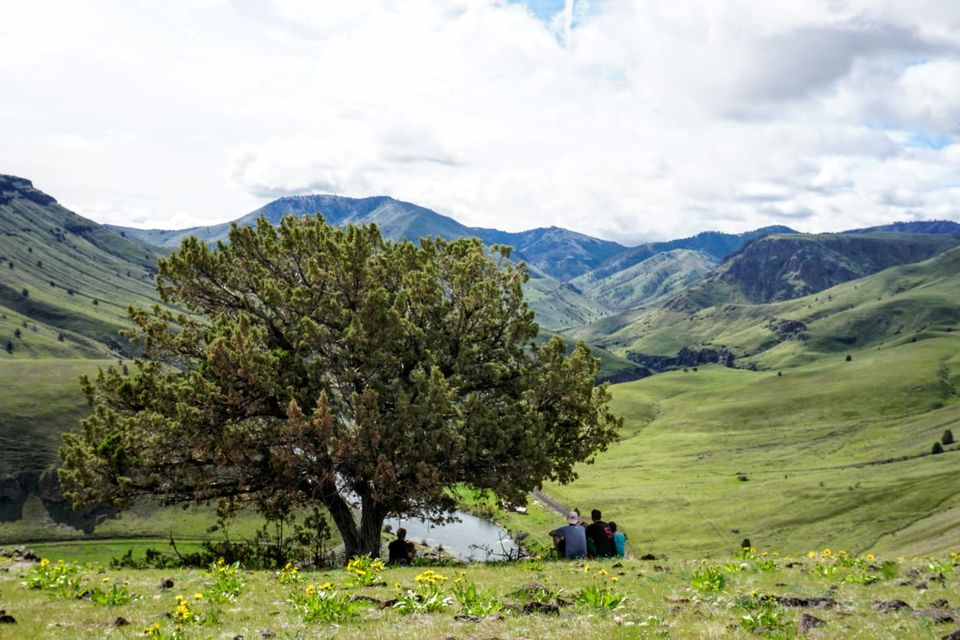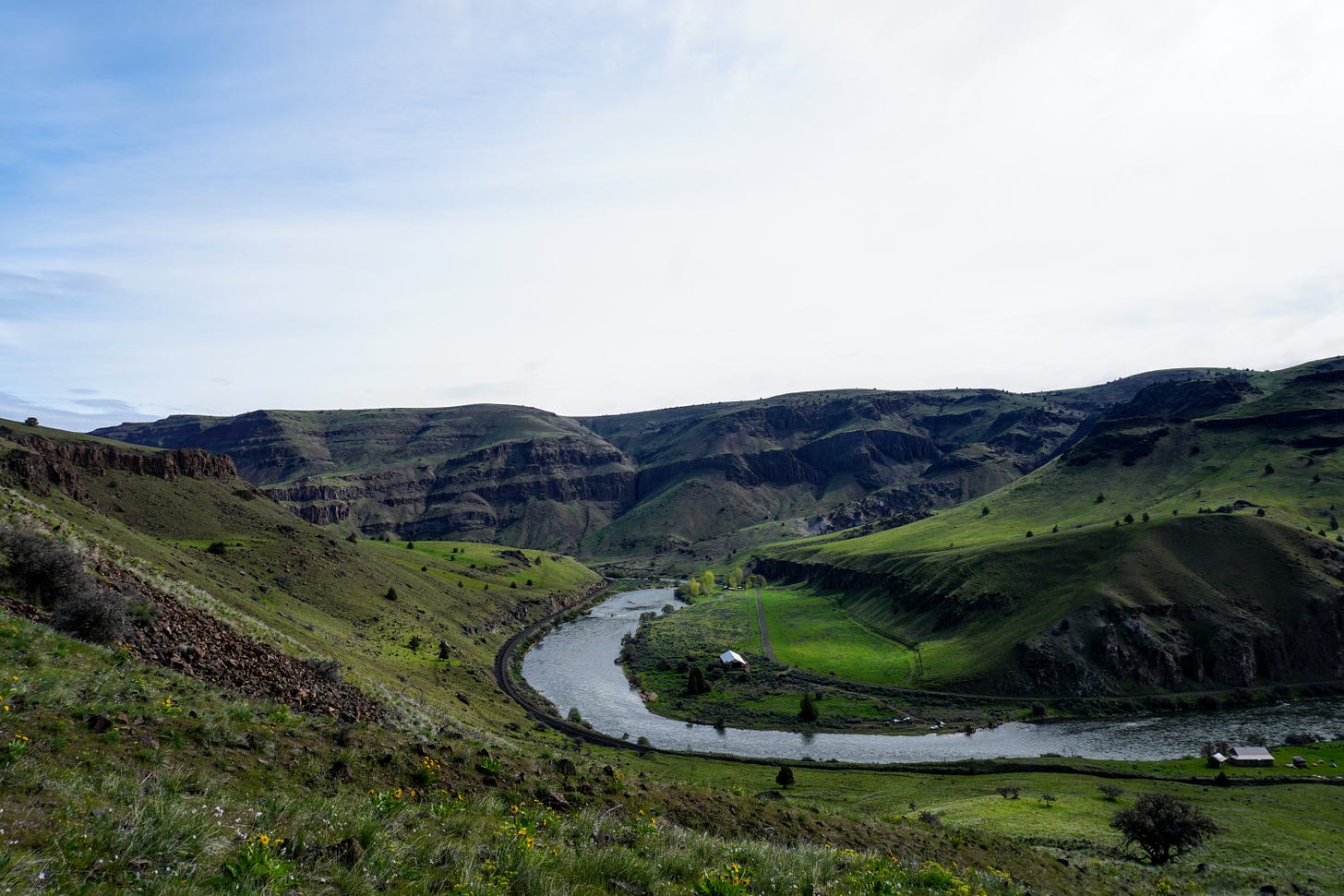Going with the flow

An issue as curvy and rambling as the Deschutes.
Last weekend we slept under the stars.
Curled into sleeping bags and camped on a cabin porch, with the Deschutes River running fast, the water rushing over rocks and eddying every now and again. Out of cell service. Surrounded by friends.
And I was still having nightmares.
A couple of years ago my dentist told me that I wasn’t grinding my teeth when I slept, but I was clenching my jaw, hard. Up to that point I hadn’t given much though to it, but after a few weeks of wearing the nighttime mouth guard her office had made up for me, I went a night without to see if it made much of a difference. I remember waking up the next and massaging the right side of my jaw, then testing the range of motion a bit.
Since then, as I’ve rooted around in my memory, I’ve slowly assembled a pattern of stress dreams—I think they’ve been around since college. The details aren’t particularly important (and they’re usually gone as soon as consciousness touches them), but the feeling is always the same. I’m frozen. I can’t move. I can’t talk. I can’t communicate with anyone. My mouth is glued shut by some unknown adhesive.
Even on the porch last weekend, with the river playing the best possible natural soundtrack, the moon shining like a pale and wonderful floodlight, my sleeping bag hood snug over my head, the stress was getting to me. And whatever was wrong in the dream I was having, I couldn’t do anything about it. I was both helpless and unable to help.
I guess the reason this stuck out to me is because of the circumstances. We were on the river thanks to the kindness and generosity of some good friends, whose family co-owns the remote fishing cabin. It’s one of the only structures on this bank of the river for miles, buried in a high-walled canyon and backing up on acres and acres of Bureau of Land Management land and a BNSF freight line. One of our friends tirelessly rowed all 20 of us and all of the gear across the river, fighting hard against the quickening spring current.
Juniper trees dot the lips of the canyon walls on both sides. There are caves in the rock walls. Ravens, ospreys, and bald eagles all nest in various perches. Rattlesnakes lurk nearby, almost always out of sight, but never out of mind. And trout run on the river.

That’s why the cabin entered the family in the first place. The patriarch was a fly fishing maven, who passed last year in his early nineties, but not before teaching his daughters and grandkids to fish and making enough trips out to the cabin that mentioning his name in the angler’s shop in Maupin brings a smile and a story to the lips of one of the owners.
It was all as stunning and peaceful as it sounds. Yet there I was last Sunday morning, blinking my eyes a bit around 6 AM as my watch face came into focus, and slowly coming to terms with the fact that all the remote fishing cabins in the world wouldn’t have saved me from the stress that sped through mind faster than the river.
There’s always a tension between what we think an experience should feel like and the actual reality of it all. Particularly in this moment, where Instagram and Facebook are engineered to make us think we are (and should be) performing our lives for the status symbols of likes and comments, it’s easy to look past such a stunning place and get caught up thinking about which keywords would best describe how perfect it was. A different version of me (a younger one, perhaps) would’ve been angry that the nightmare arrived and ruined the experience.
But so much of what I’ve been through over the last year—love and loss; joy and grief—has illustrated how rich each moment is if we take the time to sit in them. That a journey out to the cabin could be both beautiful and challenging at the same time is the true richness. Who wants flawlessness? Who believes that constant perfection is achievable, let alone worth trying for?
Fighting the stress—which, for the record, I can trace directly to the process of selling many of the material things from my parents’ house to various friends and acquaintances—actually would’ve made it stay for longer. Instead, I sat up and listened to the Deschutes, took a few deep breaths, and stared up the canyon walls in the morning light.

This Week
April 7 would’ve been Dad’s 75th birthday. I meant to write this in as an update before we left for Oregon, but so it goes. Dad loved Robert W. Service, so here’s a link to the most-read Service poem (at least in our house), The Cremation of Sam McGee.
Newsworthy
This week I have the pleasure of recommending another piece of writing from a great friend, Daniel Prentice. I had the pleasure of editing Dan for the first time in a while this week and I am so pleased to link his profile of Greta Pellerin, a deaf player for the University of Vermont’s women’s team, Ruckus. It’s ultimate jargon-free (mostly) and a joy to read.
I’m also knee deep in Nick Paumgarten’s excellent piece on the Hahnenkamm downhill on the men’s World Cup skiing circuit. Everything about this race sounds like a lawsuit waiting to happen and I can’t believe athletes are still allowed to do it.
Nonfiction
I’m a long-time fan of Emily Bazelon’s reporting. I can’t recommend her new book, Charged, enough. It’s an excellent portrayal of prosecutorial power in the U.S. criminal justice system and Bazelon’s case for why it should continue to be transformed.
If you’re a nerd like me (and I know some of you are), Dreyer’s English has me chuckling on every page. A humorous and very sensible book about style.
Television
There is an absurd amount of good television available right now and, thanks to the NBA Playoffs, I can hardly keep up. Here’s a smattering.
- Killing Eve’s second season is out and I’ve got it all queued on the DVR.
- Obligatory Game of Thrones bullet.
- Shrill on Hulu is a comedic delight—like a narrative-style of Portlandia with a strong lead and point of view.
- Letterkenny, also on Hulu, is like Clerks-era Kevin Smith with Sorkin-paced dialogue, set in rural Canada.
- And if you’re into fight movies, AMC’s Into the Badlands (horrible dialogue and plotting, excellent fight choreography) is wrapping up its final run.
Spinning
- Anderson .paak’s Ventura is at least three times better than 2018’s Oxnard.
- Sun O))) has a masterfully weird and drony-metal record out that I actually like a lot.
- It was a tough week. I listened to The National’s live record for Boxer and Spoon’s Hot Thoughts a lot.
A short disclaimer
Please remember that this newsletter is a creative space to keep in touch, to think out loud, and to heal. It takes some psychological safety to put these thoughts out in the world and the sentences won’t read perfect or be free of typos. I do revisit my issues and make corrections as I catch them.
